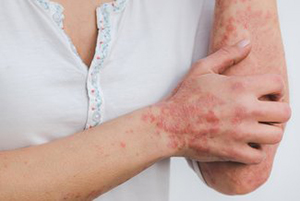Modern Medication Is Transforming the Treatment of Atopic Dermatitis

One in seven people will develop atopic dermatitis in the course of their lives. Many of those affected suffer extremely from the skin disease. However, for a few years now highly effective medications have been available. Prof. Dr. Kilian Eyerich explains how they work, and why molecular-genetic diagnostics could fundamentally change dermatology. Prof. Dr. Eyerich is the Medical Director of the Department of Dermatology at the Medical Center - University of Freiburg.
Professor Eyerich, what has changed in the treatment of atopic dermatitis in recent years?
Until a few years ago, even in the most severe cases we were only able to prescribe skin care and administer cortisone or non-directional immunosuppressants, which dampen the immune system as a whole. Now, however, we are beyond the age of cortisone. For some years now, so-called systemic therapies have been available for adults with moderate and severe atopic dermatitis. These therapies specifically interrupt certain excessive inflammatory reactions by disrupting signal transmission. Even the most severe symptoms subside in many patients.
What does this mean for patients?
It can hardly be praised enough. The disease can severely reduce the quality of life for those affected. This is because itching and pain prevent them from sleeping, and the visible skin changes are unfortunately often perceived as repulsive by their social environment.
Nevertheless, there is a persistent opinion that atopic dermatitis can hardly be treated. Why is that?
Those affected have often been living with the disease for decades. Because there was no suitable treatment until recently, many of them are no longer under medical care. They are therefore often unaware of the new options. In addition, the medication is fairly expensive, which is why some doctors are very reluctant to prescribe it. And thirdly, the medications for atopic dermatitis have a highly specific effect. This means that psoriasis, for example, which can look similar and has been treated in a similar way up to now, can even get worse with the new atopic dermatitis medication.
This is where molecular-genetic diagnostics comes in, which you are researching. Could it be something of a turning point in dermatological diagnostics and therapy?
I am convinced of that. Up to now, the classification of skin diseases has mainly been based on visual appearance. This can be compared to the descriptive botany of the 19th century. Thanks to genetics, however, we now know that plants sometimes have completely different relationships than assumed. It was similar in dermatology for a long time. But we understand the molecular-genetic causes behind skin diseases better and better. This is opening up fundamentally new therapeutic options.
You have already established several patents for the molecular diagnosis of skin diseases. What is the basic principle behind that?
We have identified certain genes in the affected skin that can be used to clearly differentiate between atopic dermatitis and psoriasis. As a next step, we need to make the diagnostics available quickly, objectively and across the board. A Freiburg start-up is currently working hard on this. We hope that first medical practices will be able to test the system before the end of this year.
What is the difference between atopic dermatitis and psoriasis?
Atopic dermatitis and psoriasis look similar on the outside, they both have genetic roots and are not transmissible. Itching usually occurs mainly with atopic dermatitis. While atopic dermatitis is common in children and often improves on its own, psoriasis usually occurs after puberty. Both conditions can often be controlled with good skin care and medication - but the inflammatory reactions in the skin differ, and modern medication is only effective for one of the conditions respectively.
Patient care, research, product development. What motivates you in your work?
I always draw my motivation from the patients. As doctors at a university medical center, we are also in a position where we can really change things for the better. That is a great incentive. And at the same time, I know how urgently the methods, diagnostics and therapies are needed. As a result, we receive great support from all sides. Because everyone is striving for success.
Please find more information here.
Back